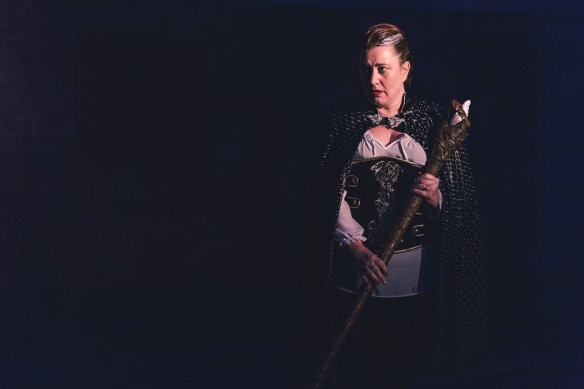
Several productions of The Tempest are set to open this summer, including our own production in Carroll Park. So what makes this Shakespeare play so relevant to 2016 audiences? The play deals with countless themes, but I want to focus on the relationship between power and freedom. Too frequently in this play, characters feel a sense of powerlessness towards things they cannot explain. As the audience though, we realize that all of these seemingly-inexplicable events stem from the hidden workings of Prospero’s magic.
If art reflects the current socio-political climate, then The Tempest is a perfect fit for what our community is dealing with. We have faced senseless acts of tragedy in recent times, and our power as individuals in times of crisis seems both fleeting and polarizing; there is no tangible middle ground. Thus we turn to art, to our community in order to set a precedent. We start small and hope that our changes will one day be reflected on a larger scale.
The current influx of gender-bent Shakespeare productions has been received with acceptance and encouragement. Not a week ago I found myself in line at the Delacorte Theatre in Central Park and began talking to a couple in front of me about Smith Street Stage’s production of The Tempest. I told the couple that our Prospero is played by the incredibly talented Kate Ross as a strong-willed, powerful woman. We began talking about how appropriate it is to have Prospero be played by a woman, particularly if we take Prospero as a physical extension of mother nature. A female Prospero serves to acknowledge that women have just as much power as men. When she affirms her identity as the most powerful figure in the play, within the hermetic environment of the island, she uses her power to reprimand those who have done her wrong. However, like anyone with power, her individual ambitions push aside those of the community. Thus when Prospero relinquishes power over the island-dwellers, she allows change to occur by allowing many voices to be heard, by giving others power, and by choosing selflessness amidst a series of reaffirmations of selfhood.
I spoke with our director, Beth Ann Hopkins, about her choice to cast Prospero as a woman, and the challenges inherent to cross-gender casting. “You never really know what kind of challenges changing gender will do until you are in the weeds with the words and actors cast,” she explained. “Once you are there and the crew is assembled, it’s more a question of, ‘What do we change the word ‘Sir’ to? Is ‘Mom’ or ‘Mother’ too intimate? Can we still call her ‘Lord’ or ‘King’? In our production, I very much wanted to create a world where gender doesn’t affect rank. A woman servant can be a butler, and also strive to be a King. Prospero can be a Duke, even though she’s a woman. New world rules, old world costumes. Once we established how to play the game of this new world, things started to fall into place and really empower the women we cast, which can only be topped by watching other females, especially the younger generation, watch our Tempest. I’m trying to create a new narrative for women in these classic stories, one where women aren’t always the victim, or the lover. Sometimes we get drunk, sometimes we get greedy with power and try to kill our brother, and sometimes, we have magic and can bend the entire storyline to our will.”
We are not the only company this summer who have explored the possibilities engendered in the cross-gender casting of The Tempest. Recently, a production of The Tempest ran in Central Park, which gained notoriety for its all-female cast and heavy use of nudity. In conversation with directors Alice Mottola and Pitr Strait, I asked why The Tempest is an appropriate choice for modern audiences.
“The spine we chose for our production was ‘to gain the freedom to be myself,’ and we were amazed to discover that this became the journey not only of the characters, but some of our actors as well.” Mottola said.
This “spine” is something that countless communities are struggling to fully realize or feel safe doing. My hope is that when people see these productions of The Tempest, a play that deals with the relationship between power and freedom, between the individual and community, they leave inspired, ready to be that person they so desire, all the while not putting their self-interest above that of the community.
By Andrew L. Ricci
Acknowledgements to Beth Ann Hopkins, Alice Mottola, Pitr Strait and Dylan Arredondo for thought-provoking conversations.
